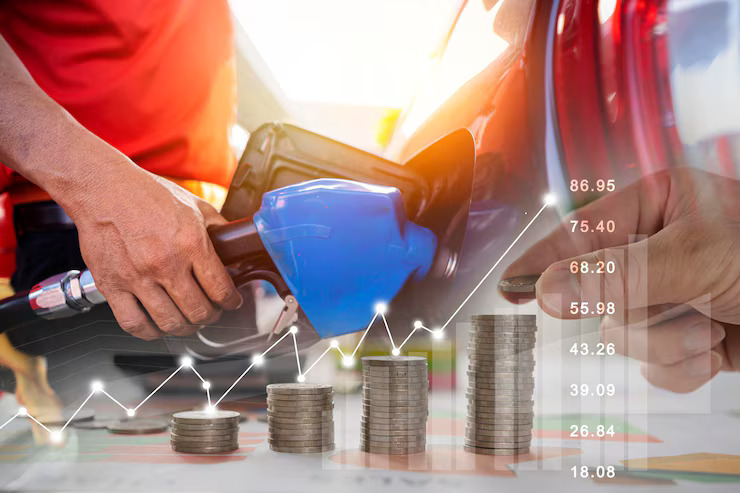Oil Minister Hardeep Singh Puri said on Tuesday that the Ministry of Petroleum and Natural Gas (MoPNG) will work on bringing petrol, diesel, and ATF under the goods and services tax (GST). India’s fuel sector has always been a topic of major debate and scrutiny. With the ever-changing global cost of oil and domestic tax patterns, the cost of petrol, diesel, and Turbine oil used in the field of aviation has often been acknowledged to be of great change. The idea to bring these fuels under the Goods and Services Tax (GST) structure has become a superb game-changer, which makes it sure that the tax structure will be more aligned and systematic. Here, we discover how this change could affect our economic growth, the oil sector, and also the consumers to a great extent and also will introduce you to the best CA Firm in Delhi for further assistance regarding tax calculations.
Present Tax Structure on Fuel
Currently, crude oil, petrol, diesel turbine fuel, and natural gas are a vital part of the GST system. However, the real system of taxation under GST has not been amended for these fuels. According to Subsection 5 of Section 12 of the 101st Constitutional Amendment Act, the GST Council has to decide a date for the imposition of GST on these items. The council has still not decided on its date. Presently, the central government imposes an excise duty on automobile fuels, while state governments add value-added tax (VAT) and sales tax. This particular taxation structure has been a topic of debate and focus for years, with various proposals for merging these taxes under the GST structure.
The Case for GST Inclusion
The basic debate for adding petrol, diesel, and ATF under the GST structure is the effective decrease in fuel costs. This could make consumers tension-free and settle with the main goals of tax simplification and equality. Also, many political parties have, in various situations, appreciated this idea, identifying its ability to decrease the pressure on mankind. Several Factors concerning this GST inclusion are as follows:
Uniformity in Taxation
One of the most burning debates for bringing petrol, diesel, and turbine fuel under the structure of GST is creating uniform taxation across borders. Presently, the change in VAT ranges from state to state leading to a crisis in fuel cost. A single GST rate would make sure that clients across India pay an equal cost for these fuels, excluding logistics and the cost of distributions.
Reducing Fuel Prices
Includes under GST could naturally decrease the total tax load on these fuels. This decrease in taxes could lead to a lowering in fuel costs, leading to ease for consumers and businesses as well.
Motivating the Economy
Lower fuel costs would decrease the cost of transportation also across different sectors, including manufacturing and services. This results in lower costs for goods and services, motivating consumers to consume and lead to economic growth. Also, the aviation sector, which mainly depends on Turbine Fuels, would gain from lower costs in operations, effectively leading to cheap flight fares and a rise in flight travel.
Simplifying Tax Compliance
For businesses, the change to GST would mean simplifying the tax compliance. Instead of being associated with authorities of multiple taxes and coming under various tax norms, companies would be associated with a single tax system. This would decrease administrative burdens and make your business easy to run.
Challenges and obstacles
Despite several supports, gaining consciousness within the GST Council has been full of obstacles. One of the major subjects is the great loss of tax revenue for the central and state governments. In the fiscal year 2024, the petroleum sector’s contributed to the government was approximately ₹7.51-lakh crore in totality. Of this, the center had ₹4.32-lakh crore in their account, while states kept ₹3.18-lakh crore. The previous fiscal year, FY23, had the same calculations, with the petroleum sector consisting of around ₹7.48-lakh crore, of which ₹4.28-lakh crore was to the center and ₹3.20-lakh crore to the states.
The transformation to GST could influence the revenue system, decreasing tension about financial stability. States specifically, might face a crisis in revenue obtainment, which they are presently not able to deal with effective financial adaptation from the center.
Loss of Revenue for States
One of the important aspects of state government is the loss of revenue. States generate income from VAT on petrol and diesel, and transforming it to GST could affect them financially as well. However, this obstacle can be removed through a revenue-sharing structure and compensation from the central government.
Initial Price Fluctuations
While the long-term impact of bringing these fuels under GST is expected to be positive, there could be initial fluctuations in prices as the market adjusts to the new tax regime. It will be crucial for the government to manage this transition carefully to avoid economic disruptions.
Political Consensus
Achieving political consensus on this issue can be challenging. States might resist the change due to fears of revenue loss and loss of control over tax rates. A collaborative approach, with assurances and compensations, will be necessary to bring all stakeholders on board.
Disparities in Tax Rates
Another major issue is the disparity in rates of taxes. Under the present GST system, the maximum tax rate, with cess was fixed at 50%. Even, the tax rates on petrol and diesel cross this percentage to a great extent. As of March 16, 2024, the taxation on diesel was fixed at 50.76%, while petrol was taxed at 63.4%. These rates show the basic costs in Delhi as the reference for these calculations.
This situation showcases a challenge to the structure of the revenue neutral rate (RNR), which tries to make sure that the transformation to GST does not lead to a kind of loss in revenue for central or state government. And to make necessary Adjustments in the GST to allow these increases in tax rates without crossing the 50% limit would need clever planning and negotiating ability.
Gaining awareness within the GST Council will need clear negotiation and a balanced attitude to mention the subject of concern of all associations. Since Hardeep Singh Puri and Suresh Gopi have been in charge, the upcoming months will be critical in fixing the flexibility and time period for this change in policy.
Conclusion
Bringing petrol, diesel, and aviation turbine fuel under the GST system has the capability to change India’s fuel sector by making an equal tax structure for all, decreasing costs, and accelerating the growth of the economy. Also, carefully considering the obstacles, especially related to state revenues and the political system, is mandatory. If amended effectively, this approach could surely be a game-changer, increasing consumers, ventures, and also the whole economy.
As one of the best Chartered Accountant firms in Delhi, we at SapTax are carefully focusing on this progress. We are dedicated to assisting our customers in understanding the ways of tax handling and managing their finances keeping in mind major changes in policies. For professional assistance and easy tax solutions, connect with us today and benefit the economy.
Page Source: https://taxo.online/latest-news/12-06-2024-we-will-try-to-bring-petrol-diesel-atf-under-gst-oil-minister/




